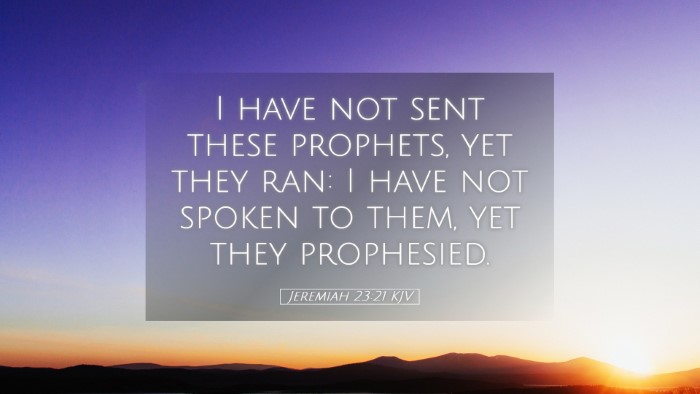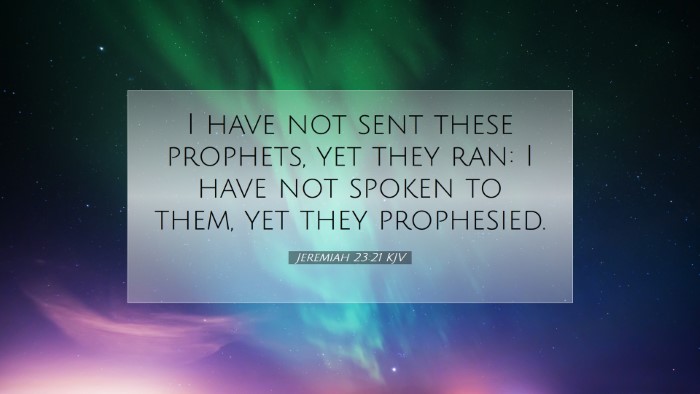Commentary on Jeremiah 23:21
Jeremiah 23:21 reads, "I did not send these prophets, yet they ran; I did not speak to them, yet they prophesied."
This profound verse addresses the issue of false prophets and highlights key themes in prophetic ministry, accountability, and divine instruction. The insights provided by various public domain commentators shed light on the implications of this verse for the church today.
Contextual Overview
To understand the weight of Jeremiah 23:21, one must consider its immediate and broader biblical context. Jeremiah, a prophet around the time of the Babylonian exile, speaks to a disheartened people misled by false hopes and prophecies. In this passage, God underscores the authenticity of His messengers and contrasts it with the deceitful pronouncements of those who speak without divine authorization.
Matthew Henry’s Insights
Matthew Henry, in his classic commentary, emphasizes the notion that God’s true prophets are divinely called and equipped for their ministry. In his analysis of Jeremiah 23:21, he notes:
-
Divine Call and Human Action: Henry articulates that the prophets sent by God do not go on their own volition; they have a divine mandate. In this verse, Jeremiah clarifies that the false prophets acted independently, thus lacking God’s authority.
-
God’s Sovereignty: He highlights the sovereignty of God over the prophetic office and the significance of speaking God’s Word. False prophets, according to Henry, diminish the sanctity of God’s Word by taking liberties that do not reflect divine intent.
-
Warning against False Prophets: Henry warns the contemporary church against the allure of unverified prophecies, underscoring the need for discernment in assessing prophetic voices.
Albert Barnes’ Commentary
Albert Barnes approaches Jeremiah 23:21 by focusing on the character of prophecy. He offers several critical insights:
-
The Nature of True Prophecy: Barnes asserts that genuine prophets are those who receive direct revelation from God. In contrast, the ones Jeremiah speaks of are self-appointed and their messages are not divinely inspired.
-
Accountability to God: He emphasizes that every prophet will ultimately be held accountable for their messages. This calls for integrity and adherence to God’s truth rather than personal ambition or gain.
-
The Call to Discernment: Barnes urges readers to cultivate discernment, challenging them to assess prophetic statements through the lens of Scripture to recognize the influence of false narratives in the current ecclesiastical climate.
Adam Clarke’s Exegesis
Adam Clarke provides an in-depth theological exploration of the text, drawing connections to the broader principles of prophetic ministry:
-
Contrast between Divine and Human Authority: Clarke elaborates on the distinction between those who are sent by God and those who intrude into the sacred office. He points out that individuals should not presume to speak for God unless they are legitimately called and directed by Him.
-
Historical Context: Clarke provides historical context to Jeremiah’s audience, noting that during times of despair and uncertainty, the temptation to heed false prophecies is heightened. He argues that the church today must guard against this same vulnerability.
-
Biblical Foundation: He calls attention to the importance of grounding prophetic messages in biblical truth. Clarke emphasizes that genuine prophets will align their words with the established canon of Scripture, enabling believers to discern true revelations from deceiving fables.
Theological Implications
The insights from these esteemed commentators suggest several theological implications that are significant for pastors, theologians, and students of the Bible:
-
The Authority of the Scriptures: As delineated in Jeremiah 23:21, the authority to prophesy resides not in human ambition but in divine authorization. The church must prioritize scriptural authority over personal or cultural understandings of spiritual leadership.
-
Discernment and Accountability: There is a pressing need for discernment in the modern church. Kelly’s warnings and Clarke’s emphasis on accountability compel congregations to be vigilant about the teachings they accept, fostering an environment that supports biblical integrity.
-
The Role of the Holy Spirit: Effective prophetic ministry today should be characterized by reliance on the Holy Spirit, echoing Jeremiah’s concern for true messengers. This reliance is essential for the church to receive genuine spiritual insights.
Conclusion
Jeremiah 23:21 serves as a solemn reminder of the centrality of divine calling in prophetic ministry. Drawing from the rich insights of Matthew Henry, Albert Barnes, and Adam Clarke, we see a potent warning against the rise of false prophets and the necessity for faithful stewardship of God's Word. This passage calls modern believers to an enduring commitment to truth, discernment, and a humble posture before the authority of Scripture as they navigate the complexities of faith and leadership in today’s world.


